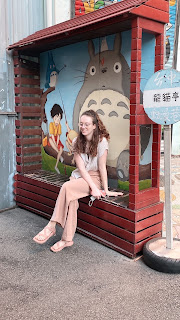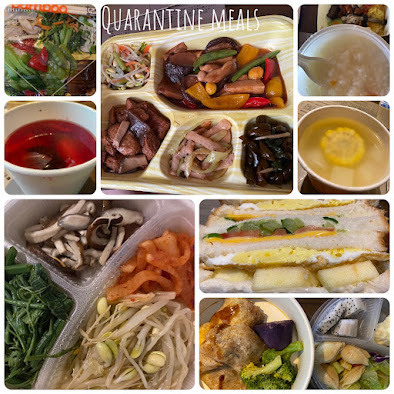You think you understand Taiwanese culture pretty well and then you meet some Taiwanese people in a phone store and they take you to Tainan and you realize you understand nothing.
 |
| 高雄旗津島, Cijin Island in Kaohsiung |
We took the train together to Taichung, where it is always ten times sunnier than in Taipei. I, of course, read my Kindle on the train; it blew my friend's mind because she'd never seen an e-reader before, even though other technological gadgets abound here. Seeing someone read English words quickly also blew her mind, because the language is so foreign to her. Many Taiwanese people cannot even read pinyin, which is the system for writing out the pronunciation of Chinese characters using the Roman alphabet, eg xièxie for 謝謝, meaning thank you. Instead, they use zhuyin, which uses some very basic characters to represent the various phonemes of Mandarin. Not only is pinyin used to teach Westerners Chinese, but it is also how I type Chinese characters on my computer, so it was weird to see a Taiwanese person unable to type characters on my phone where I had a pinyin keyboard.
 |
| 台中動畫胡同 |
 |
| Animation Alleyway, Taichung |
After we reached Taichung, in a glorious example of Taiwanese conveniency plus obsession with phone apps, my friend rented a car IN FIVE MINUTES through an app on her iPhone. Later in the night when we were ready to return it, she just left the keys in the car, took a photo of the bumpers, and left it parked on a random street where we had driven to meet another friend.
We went to an enormous night market, and they kept buying me snack after snack. My favorite was the chocolate crepe style cake (巧克力煎餅), but they were most excited about me trying coagulated duck blood (毛血旺). We also played carnival games, like archery and BB shooting; like all Taiwanese people I've encountered, they were fascinated and terrified by the fact that Americans can own guns, as they are strictly controlled here, such that only rare police officers have them. I thought the night was over when we left the night market at midnight, but then we drove to a nearby city to pick up another friend and celebrate her birthday. She was turning 29, but because 9 is considered an inauspicious number (I thought 4 was the death number, but apparently when it comes to birthdays, especially for someone who has recently had a bad year, 9 is the unlucky number), we bought her a cake that said 30 on it. We passed around the knife to cut the cake in order of whose birthday was next.
We eventually made it to a motel that was nothing like any motel which I'd ever patroned in the US. We parked the car in a private garage and then walked upstairs to a floor that was all ours. It was one continuous area with gauzy curtains, disco lights, two TVs, two big beds, a jacuzzi in the middle of the room, and two glass-walled showers. I was desperately ready for bed, since I had been up that morning for daily Chinese class at 8 am, but my friends were absolutely floored that I was considering going to bed without showering. They were truly so concerned that some Americans showered in the mornings and INSISTED I shower that night. They also thought it was strange that I wanted to sleep in the dark, as they slept that night with the TV and lights on. I also noticed they slept with something stuck to the soles of their feet. I learned it is traditional Chinese medicine and meant to pull fluids out of the body to reduce edema.
 |
| 台南大東夜市, Ta-Tung Night Market in Tainan |
My friends were still going strong talking and celebrating at 3 am when I finally gave up and fell asleep in a bed surrounded by a diaphanous canopy. They work from noon to 9 pm everyday, so their sleep schedules are shifted significantly from mine. This is pretty typical for Taiwan. I imagine the stifling hot daytimes of the tropical island in the summer might contribute to the strong culture of nightlife, from businesses staying open late to night markets to the volleyball courts under the stadium lights being packed at 9 pm when I'm walking home through the NTU campus.
The next day, after stopping at a fast food restaurant my friends were very excited about, we biked along the beach in Qijin District in Kaohsiung. It was gorgeous weather, although instead of biking or swimming in the ocean, they made us stop and take photos for hours. I found it interesting that even at the end of the trip saying goodbye to each other, they never hugged. None of my Taiwanese friends have ever hugged me, but they do hold my hand sometimes...I just go along with it.

P.S. The only thing that still shocks me is public burping. Even a professor who's hooked up to a microphone giving a lecture will still let one loose between slides.
 |
| Fish, Polly, Agness |




















































